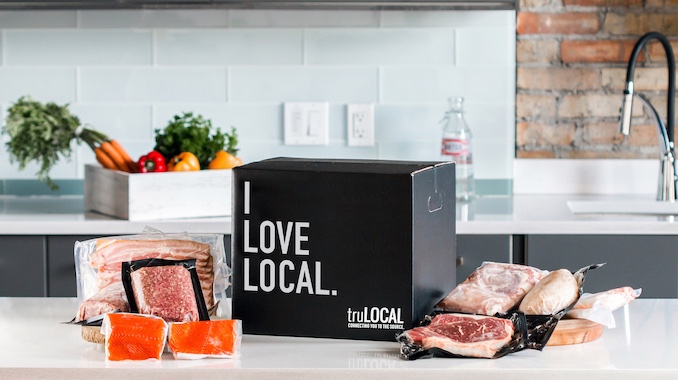Marc Lafleur is a millennial entrepreneur, co-founder and CEO of truLOCAL, a meat subscription box company that he started as a door to door venture with some friends in Ontario. It’s since grown into a booming business, catering to Canadians who want something better than what’s at the big box store — quality meat, delivered from a local, small farm. With the plant-based eating trend the buzz of the moment, we wanted to put meat, (and Marc) in the hot seat!

There is a movement that continues to grow about eating cleaner. How does that apply to the meat sector?
ML: Clean eating means a lot of different things but at its core it’s food in its purest form…unprocessed, whole foods, free of additives and preservatives. It’s influenced what we put into our bodies and that includes and how it’s produced and sourced – things we might not know depending on where you shop. Ethical eating also comes into play now – how the animal was raised, the carbon footprint. etc. All of these things are increasingly of concern for consumers.
That’s why we’re growing…with truLOCAL customers have the comfort of knowing they can trust the meat they are getting is hormone and additive free, and is quality meat. Most importantly, small farmed meats taste better and is far superior in flavour and quality.
What are the biggest misconceptions about the local food movement?
ML: There was recently a study the showed we can expect to pay up to 6% more for meat products in 2020 largely due to imported meat.
Our prices are fixed for 2020 Consumers can buy an 18-piece subscription box from us for $125. That’s pretty competitive when you’re receiving meats like grass fed beef and pasture raised chicken. In fact, our holiday boxes are really well priced starting at $99 and you can order until Dec. 23 to receive the next day. Check them out…we have a sausage box, assorted meat box, surf & turf and steak box. Nothing says “I love you” like a good box of steaks!
Can you tell us about some of your sources?
ML: Our suppliers are the backbone of the company. We provide people with more high-quality local options than your traditional big box store. We are constantly growing our supplier chain of small farms, many of them family owned. In Ontario, for example, we work with Hidden Root Farms that raises pasture raised chickens and supplies us with the best chicken sausages you can find. We offer grass fed beef from Heritage Cattle Co. We offer Ontario pickerel through Caudle’s Catch. In fact, our business model helps keep these small farms alive by bringing them another distribution stream of customers that keeps on growing.
Any food trends coming up we should be keeping an eye on?
ML: Ask any chef about the best way to cook meat, and they will tell you to start with quality. The rest is really simple – invest in a thermometer, experiment with some simple marinades that don’t camouflage or overpower the flavour of the meat. At the end of the day, meat is a timeless trend that’s here to stay. There’s a lot of buzz around plant-based eating, but in reality approximately five to seven per cent of Canadians identify as vegetarian, and another three to four per cent as vegan.
Is it true that we feel more full when eating meat?
ML: Well, I’m not a nutritionist but I know firsthand that there’s nothing like a quality piece of meat, grilled to perfection to make you feel satisfied. Quality food goes a long way in making you feel satiated and when it’s pasture-raised, like a lot of the meat found at truLOCAL, the herds and flocks are exposed to all kinds of nutrients.
What don’t people know that you wish they did know?
ML: Not all meat is created equal. This is certainly catching on but when you buy locally produced meats you are more likely than not choosing to eat humanely produced meat. That’s not to say shopping at the grocery store is bad, but more often than not you won’t have access to the same type of information about where the meat is coming from or how it’s been raised. That’s one of the benefits of being online. We’re able to give a lot more detail and information to customers while they’re browsing the site and building their box.
What impact do we make when we choose locally sourced food?
ML: When you buy locally sourced food you are having a chain reaction that affects the local economy, the environment and your health. You’re making a decision to eat better tasting, nutrient rich foods while reducing the carbon footprint that industrial foods make on our planet.
To find out more, please visit their website.



